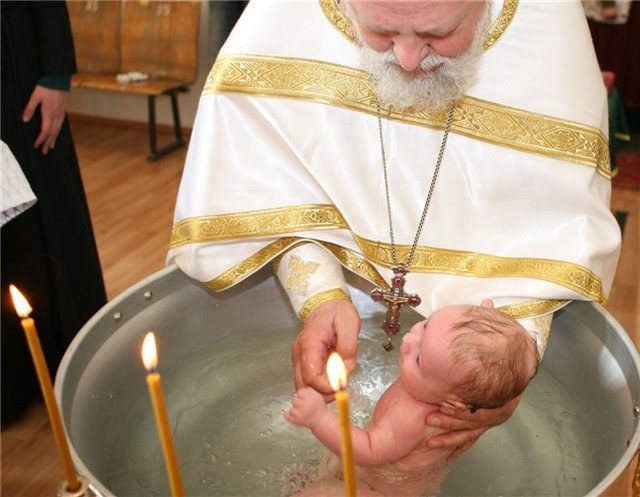The prosecutors can't simply believe that in the Church everything should be done for free, they even refer to such episodes of Scripture as the expulsion of the Savior of the merchants from the temple in Jerusalem or occasion when the Apostle Peter refused to baptize the man who offered the money for the baptism. Particular outrage is the sum: it seems that for the baptism to take too much.
People who demand that the temples were all made free, do not understand or want to understand that the temple is a material object that you have to fix that from time to time need to purchase new vestments for the priests, Church utensils and books, you need to buy the oil and incense. All this costs money.
The priests understand that visiting the temple should not become a paid service, because then it will be available not for everyone. In any Church do not take money for confession, communion, the more the mere presence at the service (for comparison: in conversation with a therapist or attending the concert have to pay). But there are events that happen in a person's life only once: baptism, wedding, funeral. Once it is possible to pay.
In essence, the fee for the sacraments and ceremonies is a donation to the temple. It would be logical not to set the price, and offer to give people money as they wish. In some churches do, but sometimes this situation creates awkwardness: people find it difficult to decide how much to give, and they ask to call them to a specific amount. The establishment of a certain price to help avoid this awkwardness.
Charge parishioners for some ceremonies and ordinances, including baptism for children, necessary for the maintenance of the temple. The costs may be different. The maintenance of the Cathedral costs more than some small Church on the outskirts of the city, and if the parents want to baptize their child in the Cathedral, they should be willing to pay more.
In some churches provide affirmation crucifix, shirt and everything else that you need for baptism, and the cost of all these items is included in the price. Then the fee for the baptism can indeed exceed 1000 p., but parents would still have to buy everything you need. Monetary costs would be the same, but the hassle would have been greater.
It should be noted that "expensive" and "cheap" is a subjective concept, and they are not always dependent on income. To pay 1900 $ per smartphone "cheap," and 500 p. for the baptism of a child is "expensive". This approach suggests that the tablet is more important than the salvation of the soul of your own son or daughter.
Of course, for a poor family the sum of 500 p could be a severe blow to the family budget, but in this case, you can explain the situation to the priest and he will go forward. If people who are not experiencing financial difficulties, consider a fee for excessive waste of baptism, then baptism in General and Christian faith in particular is their value. The possibility of Christian education of the child in such a family, raises serious doubts that casts doubt on the appropriateness of baptism.
Why not baptize free
People who demand that the temples were all made free, do not understand or want to understand that the temple is a material object that you have to fix that from time to time need to purchase new vestments for the priests, Church utensils and books, you need to buy the oil and incense. All this costs money.
The priests understand that visiting the temple should not become a paid service, because then it will be available not for everyone. In any Church do not take money for confession, communion, the more the mere presence at the service (for comparison: in conversation with a therapist or attending the concert have to pay). But there are events that happen in a person's life only once: baptism, wedding, funeral. Once it is possible to pay.
In essence, the fee for the sacraments and ceremonies is a donation to the temple. It would be logical not to set the price, and offer to give people money as they wish. In some churches do, but sometimes this situation creates awkwardness: people find it difficult to decide how much to give, and they ask to call them to a specific amount. The establishment of a certain price to help avoid this awkwardness.
Why take expensive
Charge parishioners for some ceremonies and ordinances, including baptism for children, necessary for the maintenance of the temple. The costs may be different. The maintenance of the Cathedral costs more than some small Church on the outskirts of the city, and if the parents want to baptize their child in the Cathedral, they should be willing to pay more.
In some churches provide affirmation crucifix, shirt and everything else that you need for baptism, and the cost of all these items is included in the price. Then the fee for the baptism can indeed exceed 1000 p., but parents would still have to buy everything you need. Monetary costs would be the same, but the hassle would have been greater.
It should be noted that "expensive" and "cheap" is a subjective concept, and they are not always dependent on income. To pay 1900 $ per smartphone "cheap," and 500 p. for the baptism of a child is "expensive". This approach suggests that the tablet is more important than the salvation of the soul of your own son or daughter.
Of course, for a poor family the sum of 500 p could be a severe blow to the family budget, but in this case, you can explain the situation to the priest and he will go forward. If people who are not experiencing financial difficulties, consider a fee for excessive waste of baptism, then baptism in General and Christian faith in particular is their value. The possibility of Christian education of the child in such a family, raises serious doubts that casts doubt on the appropriateness of baptism.







